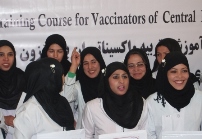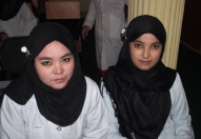 28 women from six provinces from Afghanistan's central region took part in the trainingKabul 13 November 2014 – This week 28 women graduated from a vaccination training programme organized by the Medical Management and Research Courses Afghanistan (MMRC-A) nongovernmental organization with the technical and financial support of WHO. The 3-month training brought together young women from Afghanistan’s central region to learn about the theory and practice of routine immunization.
28 women from six provinces from Afghanistan's central region took part in the trainingKabul 13 November 2014 – This week 28 women graduated from a vaccination training programme organized by the Medical Management and Research Courses Afghanistan (MMRC-A) nongovernmental organization with the technical and financial support of WHO. The 3-month training brought together young women from Afghanistan’s central region to learn about the theory and practice of routine immunization.
During the training, participants familiarized themselves with the goals and objectives of the extended programme of immunization (EPI), built their knowledge of different vaccine-preventable diseases, such as polio, tuberculosis, measles, diphtheria, tetanus and hepatitis B, and learned how to maintain the cold chain system and ensure the safety of injections.
The newly-qualified vaccinators, who had no prior experience in immunization, came from the rural areas of Bamyan, Daikundi, Kabul, Kapisa, Panjshir and Parwan provinces. The training included a month of practical training in health clinics around Kabul where trainees administered vaccinations. After finishing the training, the women will begin work as vaccinators within health centres in their districts.
 Freshtah (right) and Khadija both graduated with a 100% score from the final examinationFreshtah, who comes from a small village in Kabul province, was one of the participants. She has just finished her twelfth year at school and was eager to join the training programme to build a practical skill-set she could put to good use in her home village. “We have many challenges in Afghanistan. I want to serve the people, to help the women and children in my home district by working at the health centre administering safe vaccines,” she says. In the future, Freshtah wants to study to become a doctor.
Freshtah (right) and Khadija both graduated with a 100% score from the final examinationFreshtah, who comes from a small village in Kabul province, was one of the participants. She has just finished her twelfth year at school and was eager to join the training programme to build a practical skill-set she could put to good use in her home village. “We have many challenges in Afghanistan. I want to serve the people, to help the women and children in my home district by working at the health centre administering safe vaccines,” she says. In the future, Freshtah wants to study to become a doctor.
Recruiting women to work as health care providers and as vaccinators is not an easy task. “There are around 3000 vaccinators in Afghanistan, and only around 20% of them are women,” says Abdul Wakil, National EPI Training Coordinator at WHO. “This is a major challenge for us as many women will not go to the clinic to get vaccinated if there are no female vaccinators. This training aims to bring more female workers to health facilities and in that way improve women and children’s health.”
Khadija, who joined the training from Bamyan province, found the programme very useful and was happy to be accepted on the course. Similar to Freshtah, she had just finished her twelfth year of schooling and was looking for work.
“All topics of this training were very interesting to me. I’ve heard a lot about vaccine-preventable diseases in the media, and when I heard about this course I knew I wanted to be part of it. As a vaccinator, I want to help women and children in my district, fight vaccine-preventable diseases, and in that way contribute to decreasing morbidity and mortality in my country,” Khadija says. Both Khadija and Freshtah agree that they need more training and are determined to continue their studies.
Before organizing the training, staff at MMRC-A NGO approached communities and spoke to village shuras, elders and the women’s families about the objectives of the course and the importance of women’s participation. Through strong community dialogue, they managed to recruit more women to work as vaccinators and in that way strengthen the country’s immunization programme.
Overall, 160 women and men from 18 provinces are trained as EPI vaccinators over a 6-month period through MMRC-A NGO. Already 140 women and men have been trained by Healthnet TPO.
Despite significant progress over the past decade, Afghanistan’s national immunization programme continues to face significant challenges. Disparities in immunization coverage remain throughout the country, particularly between rural and urban areas and secure and insecure zones. Among children under five, the most vulnerable are those living in hard-to-reach communities.








